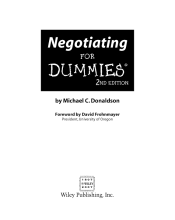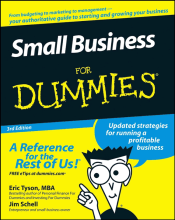Summary: Negotiating For Dummies | 9781118068083 | Donaldson
- This + 400k other summaries
- A unique study and practice tool
- Never study anything twice again
- Get the grades you hope for
- 100% sure, 100% understanding
Read the summary and the most important questions on Negotiating For Dummies | 9781118068083 | Donaldson
-
1 Negotiating for Life
-
What are the 6 basic skills of negotiating?
- Thorough preparation
- The ability to set limits and goals
- Good listening skills
- Clarity of communication
- Knowing how and when to push your pause button.
- Knowing how to close a deal
-
In which 3 areas should you prepare for negotiation?
- Yourself
- The other person
- The market
-
What is a good negotiator?
A good negotiator is often just someone who helps the other side understand all the good points of his or her proposal and gives the other person the tools and arguments to sell the proposal to whoever needs to be sold. -
2 Knowing what you Want and Preparing to Get it
This is a preview. There are 4 more flashcards available for chapter 2
Show more cards here -
How can you make an action plan?
Your action plan includes the specific tasks you need to do, whom you need to help you do them, and when you need to get each step done. Action plans make you more efficient and effective. They enable you to anticipate needs, potential problems, and the time necessary for each step.- Prioritize each of you goals.
- List the action steps required for you to accomplish each goal.
- Identify people youn eed to support you to achieve each action step.
- Identify potential obstacles to each of the action steps.
- Estimate the completion date for each of the action steps.
-
Give some tips in case you are in charge of the meeting?
- Make sure that all participants are present and ready to listen.
- State your purpose for having the meeting.
- If there is a written agenda, be sure everyone has one and take a moment to review it.
- Make a clear request for agreement on the agenda and procedure.
- Acknowledge the participants' attitudes and feelings as they relate to your purpose.
- Begin according to the agenda.
-
What are the seating tips?
- Sit next to the person with whom you need to consult quickly and privately.
- Sit opposite the person with whom you have the most conflict.
- Consider who should be clostest to the door and who should be closest to the phone. The person nearest the phone generally controls its use. The person nearest the door can control physical access to the room.
- Windows and the angle of the sun are important considerations, especially if the situation generates hear or glare.
-
5 Setting Goals
-
What do you have to ask yourself when setting business goals?
- What level do I want to reach in my career?
- What kind of knowledge, training, or skills will I need to reach a certain level in my career?
- How do I want my partner or other members of the team to perceive me?
- How much money do I want to earn? At what stage in my career do I want to earn this amount?
- Do I want to achieve any artistic goals in my career? If so, what?
-
What do you have to ask yourself when setting personal goals?
- Do I plan on starting a family? If so, when?
- Do I want to achieve any fitness or well-being goals? For instance, do I want to remain healthy at an old age? What steps do I need to take to achieve this goal?
- How much time will I reserve for leisure? What hobbies do I want to pursue?
-
What are the points to keep in mind when thinking about your goals?
- Distinguish between a goal and a purpose.
- Don't confuse goal setting with the process of deciding what to put forward as an opening offer.
- Decide whether a goal is a good goal when you set it, not after the fact.
-
Why is it important to set goals high?
Shoot high or not at all - you can be sure that the other side will never ask you to raise your goals. But remember that you don't have to become rich and famous before breakfast. Goals are too high for the deal lead to frustration and failed negotiations. For the specific negotiation at hand, consider the marketplace, current values, and your available options.
- Higher grades + faster learning
- Never study anything twice
- 100% sure, 100% understanding

































